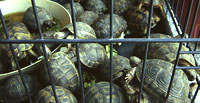
Tortoises in Yemen are slaughter prone [Archives:2007/1036/Health]
March 26 2007
 |
Sharma Natural Reserve, East of Hadramout governorate's Al-Mukalla city, is one of the most convenient places worldwide for animal species especially the rare ones or those on verge of extinction including sea and green turtles. Unfortunately, the reserve's turtles are subject to human and non-human aggressions and other risks that threaten their lives.
According to Ahmed Al-Humaiqani, General Director of Nomadic Travel Tourism Agency, turtles are slaughtered by some people in the area. “During our visit to the reserve, I was shocked to find a lot of turtles' remains scattered in the area, ” he said.
Al-Homaiqani presented photos of two slaughtered turtles captured when he was accompanying a group of Netherlands tourists during their visit to the reserve for recreation. “At 11:00 pm of the same day we arrived, we saw six men entering the reserve from the main gate by their car. They slaughtered two turtles; one of which was over 100 years old,” he confirmed.
He further expressed his sorrow that the reserve's guards were aware of the slaughtering process and facilitated it for the slaughterers. “The guards were capable of stopping the aggressors but they didn't. One of the tourists and his wife prevented them from killing more turtles and, at the same time, they took photos of the slaughtering scene,” he explained.
Reacting to the incident,Director of Environment Protection General Authority Mahmoud Shedaiwa declared those involved in killing turtles including guards will be held accountable for their offenses.
“We agreed with the local authority in the governorate to fine those involved in this act,” he said, adding, “Punitive procedures will be applied on the slaughterers as stipulated in the environment protection law number 26 in 1995.”
Shedaiwa maintained also that guard rooms have been built around Sharma reserve which is due to be declared officially as a natural reserve within this year. In addition, the reserve will be provided with guards from the Environment Protection Authority in cooperation with the local authority in order to prevent any further slaughtering of turtles.
The reason behind killing turtles is still unknown but some people confirm that some people feed on turtles' meat in some parts of the world. Yet, it seems outlandish to hear that such an act happens even in Yemen.
” Eating turtles' meat or eggs is strange for the Yemeni society. However, the situation has changed due to the surge of African refugees into the country,” Shedaiwa pointed out.
He further revealed that other factors threatening the reserve's turtles include stray dogs which spread in the area and eat turtles' eggs. In this regard, he affirmed that the authority is determined to launch campaigns to rid of the stray dogs and erect a fence around the reserve.
Adnan Saeed Al-Soumahi, sea environment specialist, explained that female turtles are the victims of human aggression that may lead to their extinction.” The problem is that only female turtles come out of the sea to lay eggs. So, when they are killed, the reproduction process is adversely affected,” he said.
Al-Soumahi maintained that fishermen and visitors also cause a lot of risks to the turtles. ” Sometimes, fishermen kill turtles when they happen to be in their fish-tackle. In addition, some visitors camp in the coast and scare turtles by lights, forcing turtles to look for another safe environment, ” he noted.
Additionally, turtles are caught by some fishermen and sent to most of the Yemeni cities including Sana'a. These turtles are sold in some flower shops wherein the price of a turtle is YR 1000 to 1500.
Upon announcing it as a natural reserve, visitors and tourists only will be allowed into Sharma and under the supervision of its staff, according to Shedaiwa.Thus,Yemen's sea animal species including turtles will be protected against extinction.
According to a study conducted by Dr. Salim Rabe'e Bazar, Chairman of Environmental Association Union of Hadramout Coast, Sharma reserve is ranked the 12th most convenient location worldwide for turtles' settlement. Bazar confirmed that the union exerts a lot of efforts to protect the reserve's turtles against any risks that may endanger their life. ” Preparations are on track to set out a project for protecting sea turtles from aggression and, consequently, maintaining Hadramout's bio-diversity, “he noted.
For his part, Head of Yemeni Association for Education and Environment Protection Sadiq Al-Osaimi confirmed that Sharma Reserve turtles are among the four rare kinds worldwide, pointing out that such species should be given enough attention, together with their eggs in order to maintain their existence. Al-Osaimi criticized such illegal acts including selling of turtles' meat or eggs turtles, noting that there is a law that specifies the mechanism of turtles' trade that should be made in the way that doesn't affect their life negatively.
——
[archive-e:1036-v:14-y:2007-d:2007-03-26-p:health]


